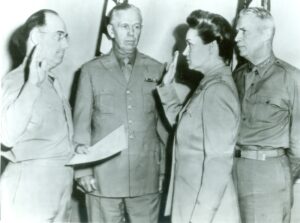Oveta Culp Hobby learned about service to community and government from her family. She watched her mother collect food and clothing for the poor and was often sent to deliver baskets of goods to neighbors. From her father she acquired a love of the law and the workings of government. As a child she would read books far above her age level. This love of reading led to her collection of a 750 volume-library by age 19. Her love of knowledge often over-shadowed any thought she gave to her own appearance. At her wedding to William Hobby her father told the bridegroom, “She doesn’t give a hang about clothes.”
She was in Washington in 1941 for business pertaining to her radio station and the Federal Communications Commission. She received a call from General David Searles, who asked her to organize a section of women’s activities for the army. Hobby refused the request. Later the general asked her to draw up a chart with recommendations on ways women could serve. She did, and he again asked her to come to Washington to put the plan into operation.
 She headed the Women’s Interest Section of the War Department from 1941-1942. At the request of General Marshall she studied the British and French women’s armies and prepared a plan for the United States. After the bombing of Pearl Harbor General Marshall tasked her with finding jobs that women could do with little or no special training. He also requested that she testify in front of Congress on a plan for a women’s army and draw up a list of recommendations of women who would lead it. Marshall accepted the list but then said, “I’d rather you took the job.” Initially declining the offer, she was sworn in as the first director of the Women’s Army Auxiliary Corp on May 16, 1942.
She headed the Women’s Interest Section of the War Department from 1941-1942. At the request of General Marshall she studied the British and French women’s armies and prepared a plan for the United States. After the bombing of Pearl Harbor General Marshall tasked her with finding jobs that women could do with little or no special training. He also requested that she testify in front of Congress on a plan for a women’s army and draw up a list of recommendations of women who would lead it. Marshall accepted the list but then said, “I’d rather you took the job.” Initially declining the offer, she was sworn in as the first director of the Women’s Army Auxiliary Corp on May 16, 1942.
Her job duties as director were very demanding. She traveled the country speaking to large groups of men and women on the very controversial subject of women in the army. She had a keen awareness of the barricades some women had to surmount in order to join the WAACs. The job was often frustrating because the WAACs weren’t considered part of the Army, so requests sent to Army engineers for plans for WAAC barracks were returned with the reply that they only worked for the Army. Eventually the WAACs became part of the Army and were renamed the WACs. Mrs. Hobby served as a colonel until the end of the war.
The items in the Oveta Culp Hobby collection were received from her estate. They are about her service in the WAAC/WAC primarily. One of the most intriguing items is a congratulatory booklet made by WACs for her Distinguished Service Medal. It, along with several other items, are available online.
